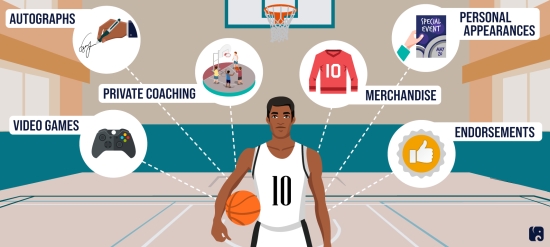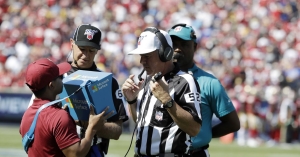In the world of sports, athletes possess remarkable talent, skills, and dedication that captivate millions of fans around the globe. However, for decades, these talented individuals at the collegiate level have been restricted from leveraging their name, image, and likeness (NIL) for personal gain. Thankfully, the recent implementation of the Name, Image, and Likeness policy has brought about a transformative change, empowering athletes to capitalize on their hard-earned fame. Today, Christopher Linton explores the significance of the NIL policy and its positive impact on athletes.
Empowering Athletes
The NIL policy represents a significant milestone in the sports industry, giving college athletes control over their brand and image. Before this policy, college athletes were often subjected to strict rules and regulations imposed by an archaic NCAA, preventing them from monetizing their personal brand. With the NIL policy, athletes can pursue endorsement deals, brand collaborations, and various entrepreneurial ventures that align with their interests and values.
Financial Stability And Compensation
One of the most notable advantages of the NIL policy is its potential to provide athletes with much-needed financial stability and compensation.
Many collegiate athletes dedicate countless hours to training and competing, often sacrificing their academic pursuits and personal lives. However, they were not allowed to benefit financially from their athletic achievements.
The NIL policy allows athletes to enter into sponsorship agreements, sell merchandise, or monetize their social media presence, offering them a chance to earn income while pursuing their athletic dreams.
Educational Opportunities
The NIL policy also opens doors for athletes to explore educational opportunities that were previously out of reach.
Student-athletes often face the dilemma of balancing their athletic commitments with their studies. With the ability to earn money through NIL agreements, athletes may have the financial means to pursue higher education or invest in personal development programs, expanding their horizons beyond the realm of sports.
Fostering Entrepreneurship And Business Acumen
By allowing athletes to engage in entrepreneurial activities, the NIL policy encourages them to develop valuable business skills and unlock their entrepreneurial potential.
Athletes possess unique insights into the world of sports, and their personal brand has the potential to attract loyal consumers. Through endorsements, collaborations, and establishing their own businesses, athletes can gain valuable experience in marketing, negotiation, and strategic decision-making, setting them up for success both during and after their athletic careers.
Promoting Equality And Fairness
Implementing the NIL policy also plays a crucial role in promoting equality and fairness within the sports industry.
Previously, professional athletes primarily enjoyed the benefits of athlete endorsements, leaving college athletes with limited opportunities. The NIL policy ensures that athletes at all levels have the same rights to profit from their NIL, creating a more level playing field and reducing the disparities between collegiate and professional athletes.
Enhancing Fan Engagement And Connection
The NIL policy fosters a deeper connection between athletes and their fans by allowing athletes to personally engage with their followers.
Athletes can leverage their social media platforms to share their stories, insights, and experiences, creating a sense of authenticity and relatability. This increased interaction can lead to stronger fan and brand loyalty and heightened engagement, benefiting athletes and fans.
Personal Brand Development
The NIL policy enables athletes to shape and develop their brand actively. Athletes are no longer restricted to being solely seen as athletes on the field but can now showcase their unique personalities, values, and interests off the field.
They can collaborate with brands and companies that align with their brand, allowing them to authentically express themselves and connect with their audience. This enhances their marketability and gives them a platform to inspire and positively influence others.
By embracing the power of their brand, athletes can become role models, advocates, and ambassadors for causes they deeply care about. They can use their platform to raise awareness for important social issues, support charitable initiatives, and inspire positive social change.
Long-Term Career Development
The NIL policy plays a crucial role in the long-term career development of athletes. While sports careers can be rewarding, they are often short-lived due to factors such as age, injuries, or retirement. By allowing athletes to capitalize on their name, image, and likeness, the policy enables them to establish a solid foundation for their post-athletic careers.
Athletes can use the financial resources gained through NIL agreements to invest in education, professional development, and entrepreneurial endeavors supporting their transition into other industries. This proactive approach to career planning ensures that athletes have options and opportunities beyond their time in sports, reducing the likelihood of sudden career changes and the challenges associated with the post-athletic transition.
Conclusion
Christopher Linton says the Name, Image, and Likeness policy does not only benefit athletes during their athletic careers but also sets them up for long-term success in various aspects of life. The policy supports their overall career development by empowering athletes to leverage their brand, pursue financial stability, and explore educational and entrepreneurial opportunities. It ensures that athletes can thrive during and after their time in sports, creating a positive and sustainable future for athletes across all levels and disciplines.






Comments powered by CComment